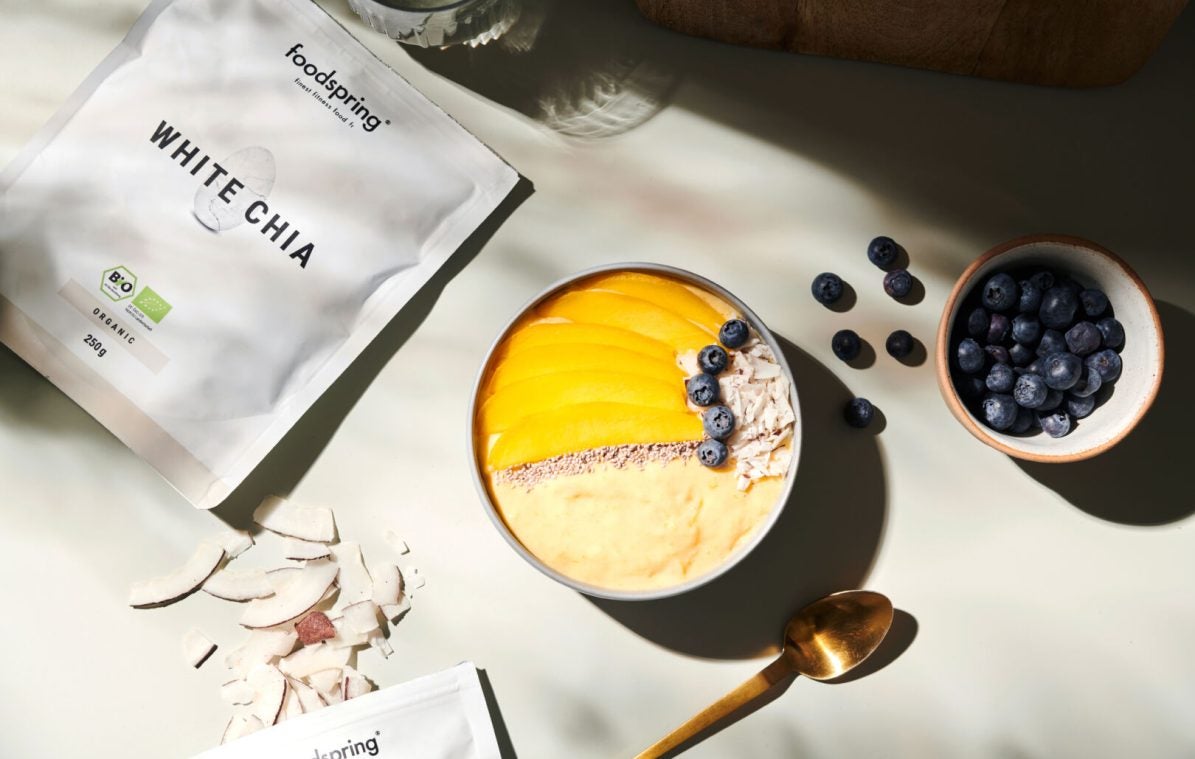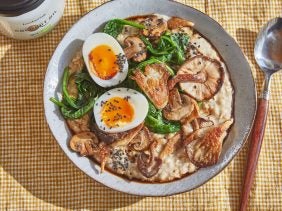5 Genius Breakfast Habits That Accelerate Your Weight Loss
 foodspring
foodspring
Let’s just get this out of the way first: If you’re looking to shed a few pounds and slim down, you should probably avoid starting your day with sugar-filled frappucinos, highly processed drive-through meals, or chocolate croissants. But that doesn’t necessarily mean that you need to punish yourself and ditch your morning meals altogether.
In fact, there’s plenty of science that links eating breakfast with successful weight loss over time. According to the Mayo Clinic’s Katherine Zeratsky, R.D., L.D., people who start their days with a healthy meal—note: healthy—may experience reduced hunger later on, they’ll have more energy to carry them through the day, and they may experience a virtuous cycle of healthy decisions that can be traced back to the choices they made in the morning. The key to using breakfast to accelerate your weight loss goals is to make some very specific decisions that will pay dividends as you go on. Curious to know what they are? Read on, because we explain it all right here.
#1 Start the Day with Protein
All your meals should have a dose of all three macronutrients—protein, fat, and carbohydrates. In some cases, the body digests nutrients better when all three are eaten together. That’s certainly true for the vitamins and minerals food contains, too. And protein is a standup star in the A.M. For instance, it may help keep your blood control within a healthy range, according to a study in Clinical Nutrition. And for people who are looking to improve their insulin sensitivity, a morning smoothie might be in order. People with type 2 diabetes who had a whey protein-based breakfast had improved glucose levels and had less hunger than those who’d had the same amount of protein but later in the day, according to a study in The Journal of Nutritional Biochemistry. We, therefore, recommend that you ensure you have high-quality proteins in the morning. With our recipe for quick overnight oats, your breakfast is not only prepared in no time, but you also get an extra portion of protein, complex carbohydrates and healthy fats.
Looking for more ways to get protein into your diet? Consider supplementing your diet with some grass-fed whey protein. Read here to learn which whey protein is right for you!
#2 Don’t Forget the Carbs
Though low-carb diets are still hanging around, when it comes to longevity, they might not be so hot. A study in The Lancet that tracked 15,000 Americans for 25 years found that those who kept to a moderate carbohydrate diet (50% to 55% of overall calories) had lower mortality than those on a low- or high-carb diet. Think high-protein oatmeal cooked with milk and topped with berries, an egg and avocado sandwich on whole-wheat toast, or a bowl of grits topped with tomato, onions, and shredded chicken—because savoury breakfasts are delicious.
Want to know which supplements can help you reach your weight-loss goals? Find out by filling out our Body Check here!
#3 Have a Bite, Even If You’re Working Out

People have a legitimate fear of eating before exercising. Cramps, upset stomach, making a beeline to the bathroom…if you’ve ever been there, you never want to repeat it again. However, research suggests having a bite might be a good idea. A group of 24 active women went through cognitive, mood, and hunger tests first thing in the morning, then given cereal amounting to either 118 or 236 calories, or no breakfast at all. Forty-five minutes later, they went for a brisk 30-minute run, and went through that same battery of tests three times more. The researchers at Northumbria University in the UK found that those who’d had breakfast were more relaxed in the time before lunch, they were less ravenous after the workout, and helped with their mood, too. (However, it wasn’t great for mid-afternoon memory or tension later in the day.) Play with having a small snack that’s at least 50% carbs that’ll help fuel your workout.
#4 Get a Dose of Fibre
There’s mixed research about the importance of fibre at breakfast in particular, but there’s consensus in the medical community that fibre is important to an overall diet. In a cohort study of 5,761 participants, researchers at the West Virginia University School of Medicine found that there seemed to be a positive association between breakfasters and lower cardiovascular mortality—something that was especially true for people who had more than 25 grams of fibre a day. Breakfast is a great opportunity to get more of the healthful carbohydrate in. Avocados, raspberries, oats, almonds, and chia seeds are top contenders to help you hit your daily fibre quota.
#5 Eat Mindfully
If you’re cramming in some breakfast while you’re running out the door or tackling your inbox, you might want to take five. A meta-analysis in Obesity Reviews found that mindful and intuitive eating strategies, as well as conventional diet programs, helped people lose significant weight. Taking a moment to eat without multitasking also reminds you that eating is pleasurable, and that food is delicious. Eating with enjoyment and without negative body self-talk is an act of self-love and self-care.
More healthy living tips from foodspring:
- 7 Best Foods to Eat Before Bed
- The Secret Reason You Should Eat Peanut Butter Before Bed
- 10 New Ways to Think About Sugar
Sources for this article
We at foodspring use only high-quality sources, including peer-reviewed studies, to support the facts within our articles. Read our editorial policy to learn more about how we fact-check and keep our content accurate, reliable, and trustworthy.

































